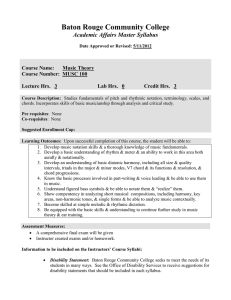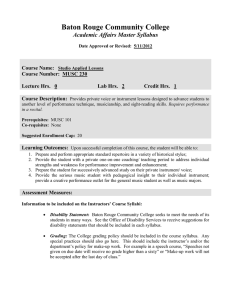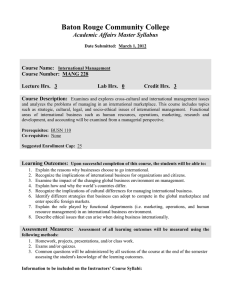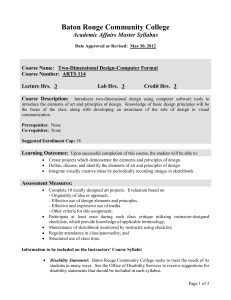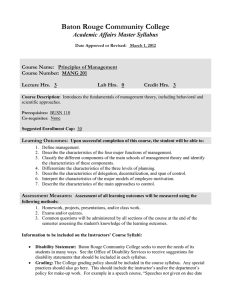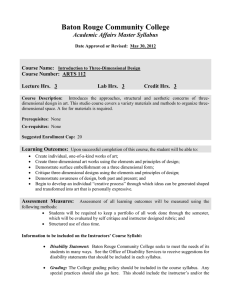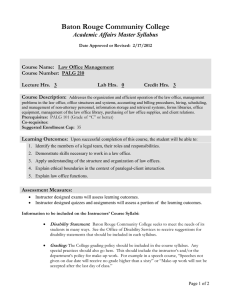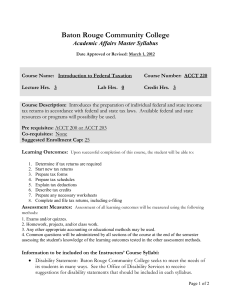Baton Rouge Community College Academic Affairs Master Syllabus
advertisement
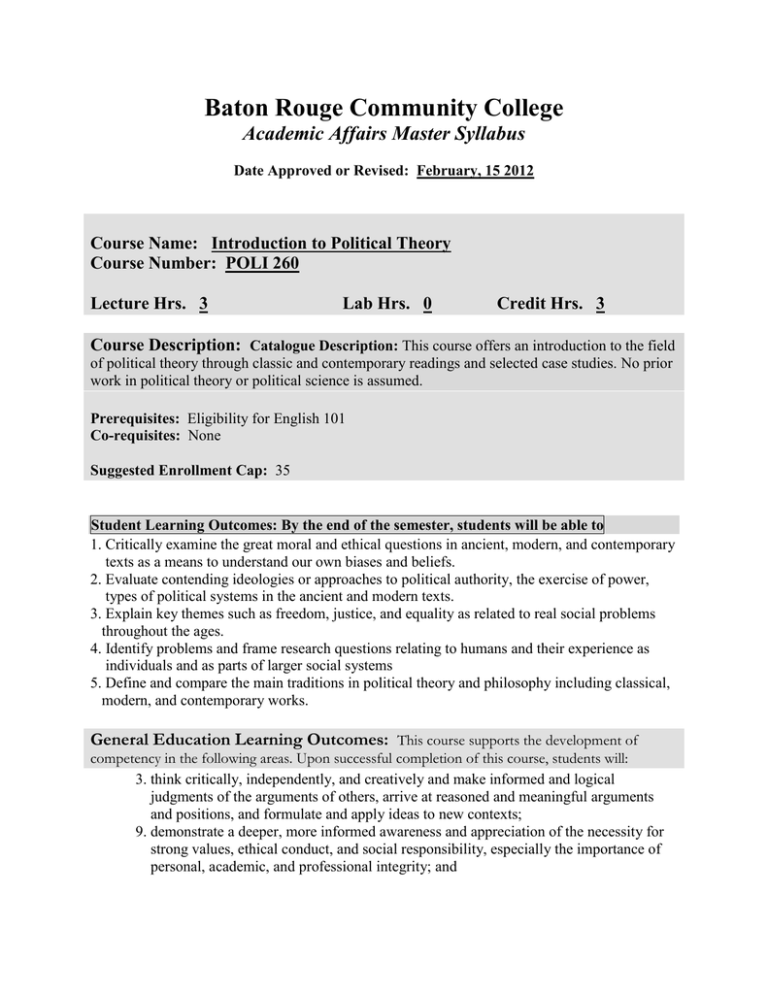
Baton Rouge Community College Academic Affairs Master Syllabus Date Approved or Revised: February, 15 2012 Course Name: Introduction to Political Theory Course Number: POLI 260 Lecture Hrs. 3 Lab Hrs. 0 Credit Hrs. 3 Course Description: Catalogue Description: This course offers an introduction to the field of political theory through classic and contemporary readings and selected case studies. No prior work in political theory or political science is assumed. Prerequisites: Eligibility for English 101 Co-requisites: None Suggested Enrollment Cap: 35 Student Learning Outcomes: By the end of the semester, students will be able to 1. Critically examine the great moral and ethical questions in ancient, modern, and contemporary texts as a means to understand our own biases and beliefs. 2. Evaluate contending ideologies or approaches to political authority, the exercise of power, types of political systems in the ancient and modern texts. 3. Explain key themes such as freedom, justice, and equality as related to real social problems throughout the ages. 4. Identify problems and frame research questions relating to humans and their experience as individuals and as parts of larger social systems 5. Define and compare the main traditions in political theory and philosophy including classical, modern, and contemporary works. General Education Learning Outcomes: This course supports the development of competency in the following areas. Upon successful completion of this course, students will: 3. think critically, independently, and creatively and make informed and logical judgments of the arguments of others, arrive at reasoned and meaningful arguments and positions, and formulate and apply ideas to new contexts; 9. demonstrate a deeper, more informed awareness and appreciation of the necessity for strong values, ethical conduct, and social responsibility, especially the importance of personal, academic, and professional integrity; and Assessment Measures: The student will be assessed and graded using some or all of the following assessment tools: Department-designed post-exam of 30 questions linked to student learning outcomes. Instructor-designed written exams will be administered throughout the semester; Each instructor will give a final exam with an essay component that will be graded by use of a department rubric; and A research paper or other investigative project will be required, graded by a departmental rubric. Information to be included on the Instructors’ Course Syllabi: Disability Statement: Baton Rouge Community College seeks to meet the needs of its students in many ways. See the Office of Disability Services to receive suggestions for disability statements that should be included in each syllabus. Grading: The College grading policy should be included in the course syllabus. Any special practices should also go here. This should include the instructor’s and/or the department’s policy for make-up work. For example in a speech course, “Speeches not given on due date will receive no grade higher than a sixty” or “Make-up work will not be accepted after the last day of class.” Attendance Policy: Include the overall attendance policy of the college. Instructors may want to add additional information in individual syllabi to meet the needs of their courses. General Policies: Instructors’ policy on the use of things such as beepers and cell phones and/or hand held programmable calculators should be covered in this section. Cheating and Plagiarism: This must be included in all syllabi and should include the penalties for incidents in a given class. Students should have a clear idea of what constitutes cheating in a given course. Safety Concerns: In some programs this may be a major issue. For example, “No student will be allowed in the safety lab without safety glasses.” General statements such as, “Items that may be harmful to one’s self or others should not be brought to class.” Library/ Learning Resources: Since the development of the total person is part of our mission, assignments in the library and/or the Learning Resources Center should be included to assist students in enhancing skills and in using resources. Students should be encouraged to use the library for reading enjoyment as part of lifelong learning. Course Outline Section I. Political Consciousness, Morality, and Ethics Week I: Introduction Week II: Political Consciousness and the Metaphysical Foundations of Politics Week III: Politics, Ethics, and Morality Section II. Political Authority, Power, and Forms of Political Organization Week IV: Political Authority Week V: Power, Leadership, and Authority Week VI: Power, Leadership, and Authority cont. Week VII: Political Conflict/Violence, State of Nature, and The State Week VIII: Political Conflict/Violence, State of Nature, and The State: Liberalism Week IX: Resistance and Civil Disobedience Week X: Radical Critique of Liberalism Section III. Liberty, Equality, and Justice Week XI: Liberty, Citizen Obligations, and Limits on the State Week XII: Freedom of Expression and Rights of Privacy Week XIII: Freedom versus Equality Week XIV: Rectification and Distribution Section IV. Citizenship: The City and the World Week XV: Citizenship and the City Week XVI: Citizenship and the World
